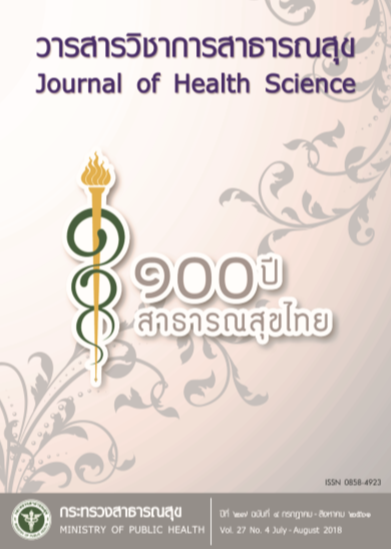Validation of Modified Kidney Disease Self-screening Questionnaire (MKIDs) for Chronic Kidney Disease Screening in Aged 40 Years and Older
Keywords:
validation, screening, chronic kidney diseaseAbstract
Chronic kidney disease (CKD) is a serious disease that is an important public health problem in global. The effects of CKD are loss of kidney function leading to complications including the development of end state renal disease and cardiovascular diseases. The objective of this study was to evaluate a screening test for kidney diseases for the general population aged 40 years and older using the modified kidney disease self-screening questionnaire (MKIDs) in order to improve the quality of the tool. It was conducted as a descriptive cross-sectional study during March and Octobery 2016. The study samples were all villagers aged 40 and above residing in the areas under the responsibility of four Sub-District Health Promotion Hospital in Muang district. Serum creatinine and urine protein were tested and the MKIDs questionnaire was utilized in all of the samples. The validity of the questionnaire data was subse-quently analyzed by using area under the receiver-operating characteristic curve (AUC), sensitivity, speci-ficity, positive predictive value (PPV), and negative predictive value (NPV). It was found that the MKIDs showed the cut point value of 8 (p=0.001) with a sensitivity of 71.3%, specificity of 72.2%, PPV 27.1%, NPV 95.0%, accuracy 27.1%, and the AUC of 77.6. In conclusion, MKIDs questionnaire was more sensitive and a higher cut point (8) when compared to previous studies. The results indicated that the reorganized chronic kidney disease screening test form was simple, easy and practical to used as the primary screening test in the community to identify persons at risk of chronic kidney disease to whom early investigation, treatment and care could be provided.
Downloads
Downloads
Published
How to Cite
Issue
Section
License
Copyright (c) 2018 Journal of Health Science- วารสารวิชาการสาธารณสุข

This work is licensed under a Creative Commons Attribution-NonCommercial-NoDerivatives 4.0 International License.







